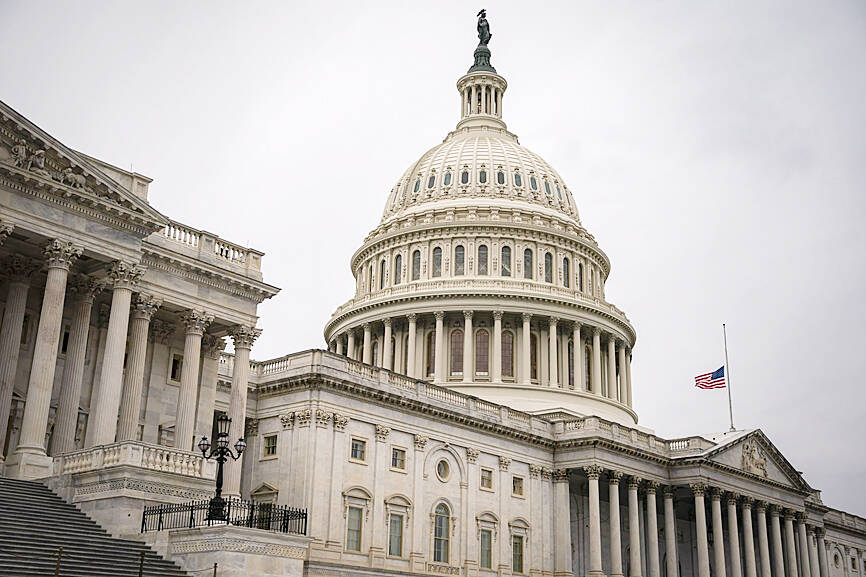The US should formally recognize Taiwan as an independent nation, and end its outdated and counterproductive “one China” policy, US Representative Tom Tiffany and 18 other US lawmakers wrote in a petition.
“It is time to change the status quo and recognize the reality denied by the US government for decades: Taiwan is an independent nation,” Tiffany told the Epoch Times. “As our long-standing and valued partner, correctly acknowledging their independence from communist China is long overdue.”
The resolution also asks the administration of US President Joe Biden to support Taiwan’s membership in international organizations and to negotiate a bilateral free-trade agreement, the newspaper said.

Photo: Bloomberg
Tiffany said in a separate interview with New Tang Dynasty TV on Wednesday that he thinks Taiwan should be recognized as a free, democratic and peace-loving nation.
“There are more and more people in [the US] Congress that are understanding how important Taiwan is, and how important it is that we recognize Taiwan, and that we trade with Taiwan,” he told the channel.
Separately, US arms sales to Taiwan are expected to be a key issue for the newly created US House of Representatives Select Committee on Strategic Competition Between the US and the Chinese Communist Party, a report published by the Roll Call newspaper said on Tuesday.
“How do we prevent Taiwan’s future from becoming Ukraine’s present? I think it is going to be a theme of what we do on this committee,” US Representative Mike Gallagher, who chairs the committee, told the newspaper in an interview.
Gallagher also said that he would examine the reasons for a US$18 billion backlog of military equipment that has been approved for sale to Taiwan.
US sectors that “may be too economically dependent on China” or “corrupted by Chinese money and influence operations” would be scrutinized by the committee, Gallagher said.
Chinese property acquisitions near US military bases and suspected Chinese police outposts in the country would also be addressed, he said.
Discussions on Chinese police operating overseas would also include Beijing’s efforts to “coerce or apply pressure to Chinese citizens living abroad,” as well as Americans of Chinese descent, he added.
The committee would also discuss banning social media app TikTok and other topics, he said.
Members of the committee would make policy recommendations, suggest policy changes and highlight initiatives led by allies in the Indo-Pacific region, Gallagher said.
However, funding would be outside the committee’s purview, he added.

A Ministry of Foreign Affairs official yesterday said that a delegation that visited China for an APEC meeting did not receive any kind of treatment that downgraded Taiwan’s sovereignty. Department of International Organizations Director-General Jonathan Sun (孫儉元) said that he and a group of ministry officials visited Shenzhen, China, to attend the APEC Informal Senior Officials’ Meeting last month. The trip went “smoothly and safely” for all Taiwanese delegates, as the Chinese side arranged the trip in accordance with long-standing practices, Sun said at the ministry’s weekly briefing. The Taiwanese group did not encounter any political suppression, he said. Sun made the remarks when

The Taiwanese passport ranked 33rd in a global listing of passports by convenience this month, rising three places from last month’s ranking, but matching its position in January last year. The Henley Passport Index, an international ranking of passports by the number of designations its holder can travel to without a visa, showed that the Taiwan passport enables holders to travel to 139 countries and territories without a visa. Singapore’s passport was ranked the most powerful with visa-free access to 192 destinations out of 227, according to the index published on Tuesday by UK-based migration investment consultancy firm Henley and Partners. Japan’s and

BROAD AGREEMENT: The two are nearing a trade deal to reduce Taiwan’s tariff to 15% and a commitment for TSMC to build five more fabs, a ‘New York Times’ report said Taiwan and the US have reached a broad consensus on a trade deal, the Executive Yuan’s Office of Trade Negotiations said yesterday, after a report said that Washington is set to reduce Taiwan’s tariff rate to 15 percent. The New York Times on Monday reported that the two nations are nearing a trade deal to reduce Taiwan’s tariff rate to 15 percent and commit Taiwan Semiconductor Manufacturing Co (TSMC, 台積電) to building at least five more facilities in the US. “The agreement, which has been under negotiation for months, is being legally scrubbed and could be announced this month,” the paper said,

MIXED SOURCING: While Taiwan is expanding domestic production, it also sources munitions overseas, as some, like M855 rounds, are cheaper than locally made ones Taiwan and the US plan to jointly produce 155mm artillery shells, as the munition is in high demand due to the Ukraine-Russia war and should be useful in Taiwan’s self-defense, Armaments Bureau Director-General Lieutenant General Lin Wen-hsiang (林文祥) told lawmakers in Taipei yesterday. Lin was responding to questions about Taiwan’s partnership with allies in producing munitions at a meeting of the legislature’s Foreign Affairs and National Defense Committee. Given the intense demand for 155mm artillery shells in Ukraine’s defense against the Russian invasion, and in light of Taiwan’s own defensive needs, Taipei and Washington plan to jointly produce 155mm shells, said Lin,